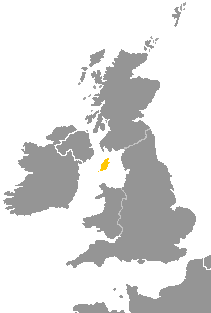| Manx | |
|---|---|
| Manx Gaelic | |
| Gaelg Gailck | |
| Pronunciation | |
| Native to | Isle of Man |
| Ethnicity | Manx |
| Extinct | 27 December 1974, with the death of Ned Maddrell[1] |
| Revival |
|
Early forms | |
| Dialects |
|
| Official status | |
Official language in | Isle of Man |
| Regulated by | Coonceil ny Gaelgey (Manx Language Advisory Council) |
| Language codes | |
| ISO 639-1 | gv |
| ISO 639-2 | glv |
| ISO 639-3 | glv |
| ISO 639-6 | glvx (historical) |
| Glottolog | manx1243 |
| ELP | Manx |
| Linguasphere | 50-AAA-aj |
 | |
 Manx is classified as Critically Endangered by the UNESCO Atlas of the World's Languages in Danger[3] | |
| Person | Manninagh |
|---|---|
| People | Manninee |
| Language | Gaelg/Glare Vanninagh (Manninish) Glare Chowree |
| Country | Isle of Man (Mannin, Ellan Vannin) |
Manx (endonym: Gaelg or Gailck, pronounced [ɡilɡ, geːlɡ] or [gilk]),[4] also known as Manx Gaelic, is a Gaelic language of the insular Celtic branch of the Celtic language family, itself a branch of the Indo-European language family. Manx is the historical language of the Manx people.
Although few children native to the Isle of Man speak Manx as a first language, there has been a steady increase in the number of speakers since the death of Ned Maddrell in 1974. He was considered to be the last speaker to grow up in a Manx-speaking community environment. Despite this, the language has never fallen completely out of use, with a minority having some knowledge of it as a heritage language, and it is still an important part of the island's culture and cultural heritage.
Manx is often cited as a good example of language revitalization efforts; in 2015, around 1,800 people had varying levels of second-language conversational ability. Since the late 20th century, Manx has become more visible on the island, with increased signage, radio broadcasts and a Manx-medium primary school. The revival of Manx has been made easier because the language was well recorded, e.g. the Bible and the Book of Common Prayer had been translated into Manx, and audio recordings had been made of native speakers.
- ^ Broderick, George (2017). "The Last Native Manx Gaelic Speakers. The Final Phase: 'Full' or 'Terminal' in speech?". Studia Celtica Fennic. XIV: 18–57.
- ^ a b Cite error: The named reference
2021 Censuswas invoked but never defined (see the help page). - ^ Moseley, Christopher; Nicolas, Alexander, eds. (2010). Atlas of the World's Languages in Danger (PDF) (3rd ed.). Paris: UNESCO. ISBN 978-92-3-104096-2. Archived from the original on 23 July 2022.
- ^ Jackson 1955, 49